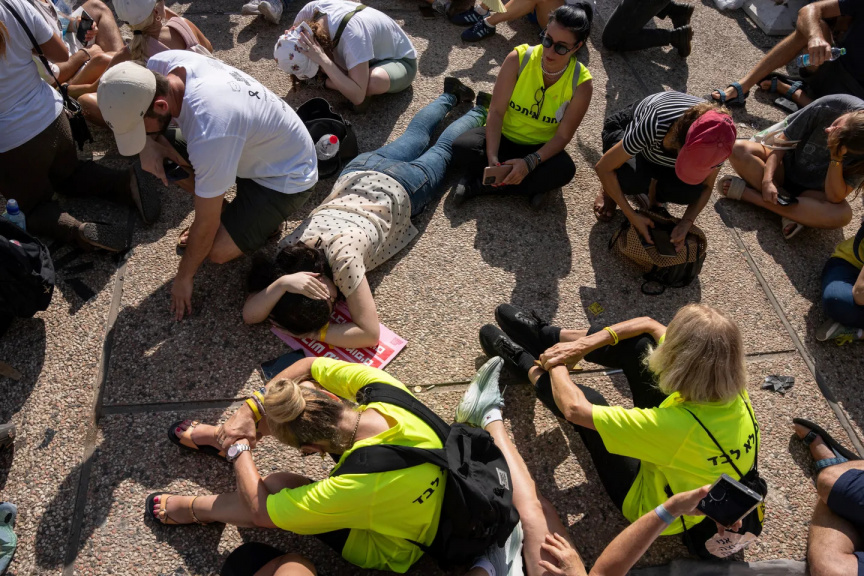
Thousands protest against Gaza occupation in Israel. (Photo/AP)
Thousands of Israelis staged a nationwide strike, blocking highways in multiple cities to pressure the Benjamin Netanyahu government to reach a prisoner swap deal with Palestinians and end its ongoing war in Gaza.
The general strike on Sunday was called by families of Israeli captives held in Gaza, who fear that last week’s decision by the Israeli government to occupy Gaza fully would endanger the lives of their loved ones.
Demonstrators attempted to block streets, tunnels, and bridges in Jerusalem and Tel Aviv, prompting authorities to use water cannons to disperse them.
Protesters also set tyres on fire, leading to widespread traffic disruption.
Hundreds of private companies, municipalities, and organisations joined the action, while public broadcaster KAN said thousands of demonstrators shut down major roads, leading to traffic gridlock and suspension of train services.
Restaurants and cafes also closed, while Haaretz reported that dozens of Israeli artists, celebrities, and athletes voiced support and joined the strike.
Major unions, including lawyers, doctors, and the business forum, as well as the Hebrew University of Jerusalem, also confirmed their participation in the strike.
Israeli police said 38 demonstrators were arrested across the country during the strike, according to the daily Yedioth Ahronoth.
Opposition participates
Opposition leader Yair Lapid visited Hostages Square in Tel Aviv to participate in the strike.
“We are shutting down the country today. Because our hostages are not pawns that the government is allowed to sacrifice for the sake of the war effort, they are citizens that the government must return to their families,” Lapid told protesters in a video posted on X.
“They won’t stop us, they won’t tire us, and they won’t exhaust us. We’ll continue to fight until the hostages return home, there’s a deal, and the war ends,” he added.
National Unity leader Benny Gantz also voiced support for protesters, demanding that the government not attack the families of the hostages.
Former Defence Minister Yoav Gallant also joined the strike in Tel Aviv in support of the hostage families.
“We have a supreme duty to bring everyone home,” Gallant said in statements carried by the Yedioth Ahronoth daily.
Presidents of Israeli universities were present in the protests to demand that the Netanyahu government reach a ceasefire and a hostage swap deal.
"Last March, all heads of universities and colleges in Israel signed a letter to the Prime Minister. We stated clearly that the government must complete the agreement and bring everyone back,” Daniel Chamovitz, President of Ben-Gurion University of the Negev, said in his speech.
“This was not a political claim; it was a moral and conscientious demand,” he added.
Far-right
Far-right opposition and far-right members of the Israeli government denounced the strike, with far-right Finance Minister Bezalel Smotrich accusing organisers of “emotional manipulation benefiting Hamas.”
“As it looks right now, despite a crazy buildup by irresponsible media and a series of self-interested political actors, the campaign is not gaining traction and involves very few people,” he claimed.
Far-right National Security Minister Itamar Ben-Gvir said on X that the demonstrators are “the same people who weakened Israel then and are trying to do so again today.”
On August 8, Israel’s Security Cabinet approved Netanyahu’s plan to occupy Gaza City fully, drawing sharp international backlash from many countries and human rights bodies.
According to Israeli estimates, around 50 captives remain in Gaza, including 20 believed to be alive, while Israel holds more than 10,800 Palestinians in its prisons under dire conditions, with rights groups reporting deaths due to torture, hunger, and medical neglect.
___
Source: TRT